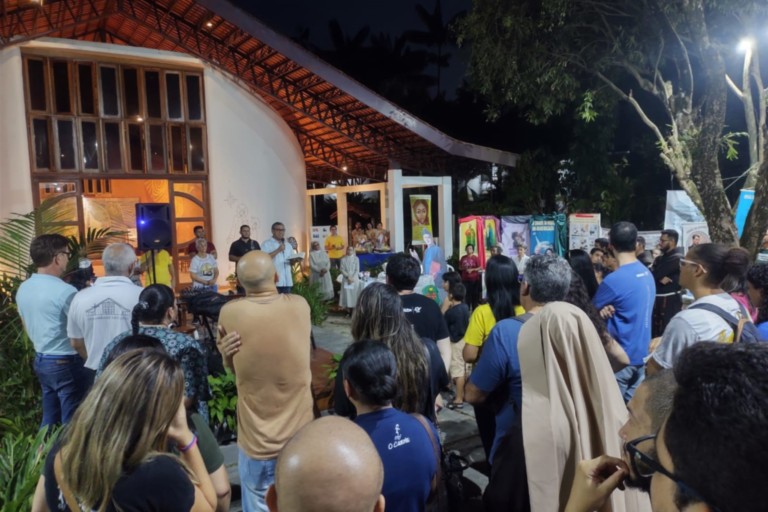Go and invite everyone to the banquet!

"Go and invite everyone to the banquet" is a central expression of the missionary mandate that deeply resonates with the Amazonian Church, especially in the context of our communities and current challenges. The invitation to the banquet, as expressed by Jesus in the parable (Mt 22:1-14), is not only about attending an event but entering a new reality of communion and fullness of life, accessible to all without exception. Pope Francis' message for World Mission Day 2024 reinforces this urgency: the mission is tireless, universal, and full of joy, like the king's invitation to the servants to call everyone, both good and bad, to the wedding feast.
The mission, as described by the Pope, must be tireless. The Church is called to "go," to move towards all peoples, especially those who do not yet know or have received the Good News. This dynamic is also reflected in the guidelines of the Archdiocese of Manaus, which calls us to go out to meet those who are distant, marginalized, or have never truly been evangelized. In our parishes and rural communities, this "going" must translate into missionary presence in the peripheries, pastoral care, and the formation of missionary disciples. The gospel must reach all environments, including those forgotten or far away.
Pope Francis reminds us that the "banquet" to which we invite people is not just any celebration but the eschatological banquet of the Kingdom of God. He calls us to full and active participation in the life of the Church, especially in the Eucharist, which is a foretaste of that banquet. In this sense, the theme of the novena of Our Lady of Sorrows parish, in 2024, where I serve, fits perfectly into the missionary vision of the Church. With the theme "With Our Lady of Sorrows, let us care for creation: protecting our common home," and the motto "Planet Earth groans in labor pains," we are challenged to see the care of creation as an integral part of the evangelizing mission. Care for the environment, human life, and the dignity of people is essential to God's invitation to the banquet.
In the Amazonian context, the call to mission takes on an even deeper dimension. The Amazon, with its biodiversity and cultural richness, is a symbol of our common home, which suffers from environmental devastation, fires, and the predatory exploitation of our natural resources. Pope Francis, in the Synod for the Amazon and his encyclical Laudato Si', reminds us that evangelization and environmental care are intrinsically linked. The destruction of the Amazon not only affects nature but also the peoples who depend on it for their survival, especially indigenous communities, who have an intimate relationship with the land and its resources.
Our pastoral guideline (Archdiocese of Manaus) emphasizes that being a Church with "Amazonian faces" means not only proclaiming the Gospel but also protecting life, human dignity, and creation. The IV Meeting of the Catholic Church in the Amazon, celebrated during the 50th anniversary of the Santarém Meeting, reaffirmed this commitment, highlighting that evangelization must be inculturated and liberating. The mission to advance into deeper waters, as suggested by the Gospel of Luke (Lk 5:4), means embracing today's challenges with courage, without fear of engaging in the social and environmental issues that afflict our region.
Mission is not just an effort to evangelize with words but to act in defense of life and creation. In practice, this means that our parishes and rural communities need to be places of formation, where everyone is called to protect human dignity and combat the threats to life, such as environmental destruction and the unjust exploitation of natural resources. This includes promoting concrete preservation initiatives, combating the fires that destroy the Amazon territory, and forming Christians aware of their role in protecting our common home.
The theme of the 2024 novena of Our Lady of Sorrows, "Planet Earth groans in labor pains," invites us to a deep reflection: the environmental crisis is not just an ecological problem but a spiritual one. As Christians, we are called to listen to the "groans" of the earth and respond with actions that protect life. Mary, Our Lady of Sorrows, who accompanied the pains of her Son on the cross, is an example of care and solidarity. Similarly, we are invited to be a living, animated, and active Church that cares for creation and the sorrows of our time.
Thus, the mission in our Archdiocese of Manaus (beloved Amazonia) must be driven by the missionary zeal of a Church that goes forth, not content with what has already been done but always seeking new ways to evangelize and protect life. The participation of all is essential, as the mission is universal, and the invitation to the banquet is for everyone. As Pope Francis highlighted, the mission must be carried out with proximity, compassion, and tenderness, without imposition or proselytism, but with the joy of knowing that the Lord is near and that the Kingdom of God is among us.
We conclude with the certainty that the mission to "go and invite everyone to the banquet" urges us to a renewed missionary conversion, where care for human life and creation go hand in hand. May Our Lady of the Immaculate Conception, Patroness of our Archdiocese, guide and inspire us to be truly a synodal and missionary Church, committed to evangelization and the defense of human life and our common home. May we, with burning hearts and feet on Amazonian soil, continue the mission of Christ, inviting everyone to partake in the feast of full life in the Kingdom of God.
* Jose Domingos Barão is a Priest of Foreign Mission Society of Quebec. He was born in Tefe, state of Amazonas, in the heart of the Brazilian Amazonia. After a period of pastoral ministry in Kenya, he is now the parish priest of the community "Paróquia Nossa Senhora das Dores", in Manaus.
